“Flambeau!” he cried (Фламбо! – кричал он), and shook his friend by both hands again and again (и жал своему другу обе руки снова и снова; to shake hands – пожать руку /кому-л./; to shake – трясти), much to the astonishment of that sportsman (/приводя/ в сильное удивление этого любителя рыбной ловли; to astonish – изумлять, удивлять; sportsman – спортсмен; рыболов), as he came on shore with his fishing tackle (когда он сошел на берег со своими рыболовными снастями).
As he sat on the steps of the landing-stage ruminating he grew conscious of the tall, dark streak of a sail coming silently down the shining river, and sprang to his feet with such a backrush of feeling that he almost wept.
“Flambeau!” he cried, and shook his friend by both hands again and again, much to the astonishment of that sportsman, as he came on shore with his fishing tackle.
“Flambeau,” he said, “so you’re not killed (Фламбо, – сказал он, – значит, вас не убили)?”
“Killed!” repeated the angler in great astonishment (убили? – повторил рыболов в величайшем изумлении). “And why should I be killed (а почему же меня должны были убить)?”
“Oh, because nearly everybody else is (ох, потому что почти все остальные /убиты/; everybody – каждый, всякий; все; else – еще, кроме),” said his companion rather wildly (сказал его друг: «товарищ» весьма невразумительно; wild – дикий /о животных/; сумасбродный, необдуманный). “Saradine got murdered (Сарадин убит /на дуэли/; to murder – совершить предумышленное убийство), and Antonelli wants to be hanged (Антонелли хочет, чтобы его повесили), and his mother’s fainted (его мать в обмороке; to faint – терять сознание, падать в обморок), and I, for one, don’t know (а что до меня, то я не знаю; for one – что касается, например) whether I’m in this world or the next (нахожусь ли я в этом мире или /уже/ в ином; next world – мир иной; next – следующий). But, thank God, you’re in the same one (но, хвала Господу, вы вместе со мной: «вы в том же самом мире»; the same – тот же самый).” And he took the bewildered Flambeau’s arm (и он взял озадаченного Фламбо под руку; to bewilder – смущать; ставить в тупик, приводить в недоумение).
“Flambeau,” he said, “so you’re not killed?”
“Killed!” repeated the angler in great astonishment. “And why should I be killed?”
“Oh, because nearly everybody else is,” said his companion rather wildly. “Saradine got murdered, and Antonelli wants to be hanged, and his mother’s fainted, and I, for one, don’t know whether I’m in this world or the next. But, thank God, you’re in the same one.” And he took the bewildered Flambeau’s arm.
As they turned from the landing-stage (когда они повернули от причала = покинув причал) they came under the eaves of the low bamboo house (они проходили под низким карнизом бамбукового дома), and looked in through one of the windows (и заглянули внутрь сквозь одно из окон), as they had done on their first arrival (/в точности/, как они это сделали, когда впервые прибыли /на остров/). They beheld a lamp-lit interior (они узрели залитое светом ламп внутреннее убранство; to behold; to light – освещать; interior – внутренняя часть; интерьер) well calculated to arrest their eyes (будто специально рассчитанное на то, чтобы привлечь их взоры; well – хорошо; действительно, вполне; to calculate – вычислять, подсчитывать; рассчитывать на /что-л./; to arrest – арестовывать, задерживать; приковывать /взоры, внимание/; eye – глаз, око; взгляд). The table in the long dining-room had been laid for dinner (стол в длинной столовой был накрыт к обеду; to lay – класть, положить; накрывать /на стол/) when Saradine’s destroyer had fallen like a stormbolt on the island (когда погубитель Сарадина, как гром среди ясного неба, появился на острове; to destroy – разрушать; лишать жизни, убивать; to fall – падать; налетать, набрасываться; storm – буря, гроза; bolt – арбалетная стрела; удар молнии, грома).
As they turned from the landing-stage they came under the eaves of the low bamboo house, and looked in through one of the windows, as they had done on their first arrival. They beheld a lamp-lit interior well calculated to arrest their eyes. The table in the long dining-room had been laid for dinner when Saradine’s destroyer had fallen like a stormbolt on the island.
And the dinner was now in placid progress (теперь там мирно обедали; placid – безмятежный, мирный; to be in progress – происходить, иметь место), for Mrs. Anthony sat somewhat sullenly at the foot of the table (миссис Энтони немного угрюмо сидела в конце стола; to sit; somewhat – отчасти, слегка; sullenly – угрюмо, замкнуто; foot – ступня; основание, нижняя часть), while at the head of it was Mr. Paul, the major domo (тогда как во главе его находился мистер Пауль, дворецкий; major domo – мажордом; дворецкий), eating and drinking of the best (/который/ пил и ел все самое лучшее), his bleared, bluish eyes standing queerly out of his face, his gaunt countenance inscrutable (мутно-голубые глаза странным /образом/ выделялись на его худом, загадочном лице; to stand out – выделяться; bluish – голубоватый, синеватый; gaunt – сухопарый; countenance – выражение лица), but by no means devoid of satisfaction (имевшем довольное выражение: «отнюдь не лишенном удовлетворения»; by no means – никоим образом не; нисколько не, отнюдь не).
And the dinner was now in placid progress, for Mrs. Anthony sat somewhat sullenly at the foot of the table, while at the head of it was Mr. Paul, the major domo, eating and drinking of the best, his bleared, bluish eyes standing queerly out of his face, his gaunt countenance inscrutable, but by no means devoid of satisfaction.
With a gesture of powerful impatience, Flambeau rattled at the window (с нетерпеливым жестом Фламбо настойчиво постучал в окно; powerful – сильный, могучий; веский, убедительный; to rattle – трещать, грохотать), wrenched it open (рывком открыл его; to wrench – вывертывать, выкручивать; дергать, вырывать), and put an indignant head into the lamp-lit room (и, /вне себя от/ возмущения, просунул голову в залитую светом ламп комнату; to put into – вставлять; indignant – негодующий, возмущенный).
“Well,” he cried (чудесно, – воскликнул он; well – хорошо; отлично). “I can understand you may need some refreshment (я могу понять, что вам, возможно, необходимо подкрепить силы; to refresh – освежать, обновлять; восстанавливать силы), but really to steal your master’s dinner (но, честно говоря, красть обед своего хозяина; really /вводное слово/ – по правде говоря, вообще говоря) while he lies murdered in the garden (в то время, как он лежит убитый в саду) – ”
With a gesture of powerful impatience, Flambeau rattled at the window, wrenched it open, and put an indignant head into the lamp-lit room.
“Well,” he cried. “I can understand you may need some refreshment, but really to steal your master’s dinner while he lies murdered in the garden – ”
“I have stolen a great many things in a long and pleasant life (за свою долгую и славную жизнь я украл массу различных вещей; to steal; a great many – очень много, громадное количество; pleasant – приятный, радостный),” replied the strange old gentleman placidly (откликнулся странный пожилой джентльмен /совершенно/ спокойно; placid /прил./ – безмятежный, мирный); “this dinner is one of the few things I have not stolen (но этот обед – одна из немногих вещей, которых я не крал; to steal). This dinner and this house and garden happen to belong to me (так вышло, что этот обед и этот дом и сад принадлежат мне; to happen – случаться, происходить).”
A thought flashed across Flambeau’s face (лицо Фламбо озарилось догадкой; thought – мысль; идея; to flash – сверкать, вспыхивать; быстро промелькнуть, пронестись). “You mean to say,” he began (вы хотите сказать, – начал он; to mean – подразумевать, иметь в виду; хотеть сказать), “that the will of Prince Saradine (что в завещании принца Сарадина; will – воля, сила воли; завещание) – ”
“I have stolen a great many things in a long and pleasant life,” replied the strange old gentleman placidly; “this dinner is one of the few things I have not stolen. This dinner and this house and garden happen to belong to me.”
A thought flashed across Flambeau’s face. “You mean to say,” he began, “that the will of Prince Saradine – ”
“I am Prince Saradine,” said the old man, munching a salted almond (я – принц Сарадин, – сказал старик, жуя соленую миндалину).
Father Brown, who was looking at the birds outside (отец Браун, который наблюдал за птицами в саду: «снаружи»), jumped as if he were shot (подпрыгнул так, будто в него выстрелили; to shoot), and put in at the window a pale face like a turnip (и сунул в окно свое бледное, как репа, лицо; to put in – вставлять, всовывать).
“You are what?” he repeated in a shrill voice (вы – что? – спросил: «повторил» он тоненьким голосом; shrill – пронзительный, резкий; высокий /о голосе, звуке/).
“Paul, Prince Saradine, A vos ordres (Пауль, принц Сарадин, к вашим услугам; à vos ordres /фр./ – есть! слушаюсь!; к вашим услугам),” said the venerable person politely (сказал его светлость вежливо; venerable – многоуважаемый, почтенный; person – личность, особа), lifting a glass of sherry (поднимая стакан с шерри).
“I am Prince Saradine,” said the old man, munching a salted almond.
Father Brown, who was looking at the birds outside, jumped as if he were shot, and put in at the window a pale face like a turnip.
“You are what?” he repeated in a shrill voice.
“Paul, Prince Saradine, A vos ordres,” said the venerable person politely, lifting a glass of sherry.
“I live here very quietly (я живу здесь очень тихо), being a domestic kind of fellow (будучи человеком домашнего склада; kind – сорт, разряд; характер, сущность; fellow – человек, парень /разг./); and for the sake of modesty I am called Mr. Paul (и из скромности зовусь мистер Пауль; for the sake of – ради /кого-л., чего-л./), to distinguish me from my unfortunate brother Mr. Stephen (чтобы отличаться от моего несчастного брата мистера Стефана). He died, I hear, recently – in the garden (он недавно умер, как я слышал, в саду). Of course, it is not my fault (разумеется, не моя вина; of course – конечно, несомненно) if enemies pursue him to this place (если враги преследовали его вплоть до этого места). It is owing to the regrettable irregularity of his life (это /все/ из-за отсутствия порядка в его жизни; owing to – вследствие, благодаря; irregularity – ненормальность, неправильность; беспорядочность; regular – нормальный, привычный). He was not a domestic character (по характеру он не был домоседом; domestic – домашний; любящий домашний уют).”




